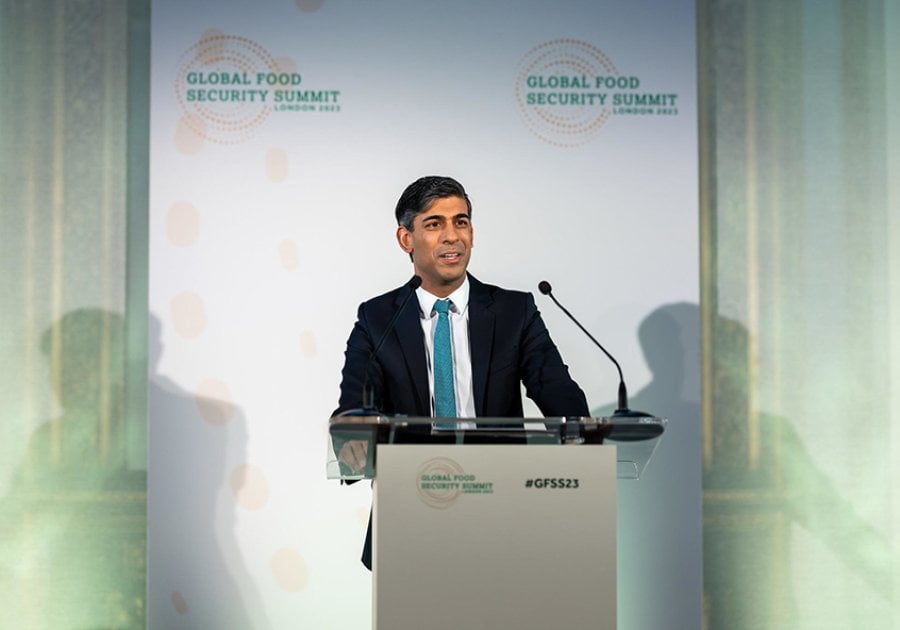Healthy diets project announced at UK Global Food Security Summit
22 November 2023 London School of Hygiene & Tropical Medicine London School of Hygiene & Tropical Medicine https://lshtm.ac.uk/themes/custom/lshtm/images/lshtm-logo-black.png
UK Prime Minister Rishi Sunak announced the launch of the UK-CGIAR Centre at the UK Global Food Security Summit in London on 20 November 2023.
The event, hosted by the Foreign, Commonwealth & Development Office, brought together governments, international organisations, scientists, philanthropic organisations, NGOs and the private sector to galvanize action on global food insecurity.
The UK government wants to harness the country’s strengths in science and technology to help tackle the interconnected challenges of global food security and climate change. With funding from the Foreign, Commonwealth & Development Office (FCDO), the UK-CGIAR Centre has been created to help achieve this ambition by strengthening ties between CGIAR, the world’s largest global agricultural innovation network, and cutting-edge UK science.
Prime Minister, Rishi Sunak said: “We’re launching a new UK-CGIAR Science Center to drive cutting edge research on flood tolerant rice, disease resistant wheat and much more. These innovations will reach millions across the poorest countries as well as improving UK crop yields and driving down food prices.”
The launch included the announcement of a range of UK-CGIAR projects including the expansion of the Fruits and Vegetables for Sustainable Healthy Diets (FRESH) project into an Expanded Network with UK Partners (FRESH-EN UP) led by researchers at the London School of Hygiene & Tropical Medicine (LSHTM).
Tanzania’s agricultural sector is highly exposed to climate change with higher temperatures and decreasing rainfall leading to reduced agricultural production. The cost of nutrient dense foods in the country has increased, with many Tanzanians lacking access to sufficient safe and nutritious foods. More than a quarter of the country’s children under the age of five exhibit stunting, where they fail to reach their growth potential. Reduced crop yields are also affecting the incomes of Tanzania’s small-scale food producers.
FRESH-EN UP will bring new perspectives, capacity and expertise to develop and test innovative strategies to increase consumption of fruits and vegetables in Tanzania, especially among nutritionally at-risk populations such as women of reproductive age and adolescents, through the promotion of climate-smart agricultural practices, measures to reduce food loss and waste, and food environment and demand-generation interventions.
To undertake this work UK-CGIAR has connected LSHTM with the International Food Policy Research Institute (IFPRI) and Sokoine University of Agriculture (SUA) to leverage each organisation’s expertise. A wider set of partners will be involved through co-development workshops.
Edward Joy, Assistant Professor at LSHTM and lead of the FRESH-EN UP project, said: “Tanzania has achieved huge improvements in health and development over recent years, however malnutrition remains a major problem with low average consumption of nutrient-dense foods, including fruits and vegetables.
“The FRESH project is conducting crucial work to understand barriers to greater fruit and vegetable production and consumption, and to co-design scalable interventions to address these barriers. We are excited to join forces on this effort through the FRESH-EN UP project, working with national government and academic partners and the CGIAR to improve nutrition through increased fruit and vegetable consumption in rural Tanzania.
“Our ambition is to work with national stakeholders in support of their nutrition and development priorities, particularly around enabling access to nutritious diets through sustainable and resilient agricultural production systems.”
UK scientific institutes have a long history of working with CGIAR, but these collaborations will benefit from a refreshed vision and investment. The Centre will be forging dynamic, new collaborations between CGIAR, UK science institutes and research centres in LMICs, as well as galvanising existing partnerships.
CABI will direct the Centre’s Secretariat. It will manage the day-to-day operation of the Centre, liaising with the other core members of the Centre: FCDO, CGIAR, and the Biotechnology and Biological Sciences Research Council (representing UK Research and Innovation). Its roles will also involve relationship management with existing and prospective partners, communications support, project commissioning, as well as monitoring, evaluation, and reporting.
Professor Lindiwe Majele Sibanda, Chair, CGIAR System Board said: “I’m delighted to witness the launch of this initiative. This is an excellent opportunity to strengthen CGIAR’s existing ties with the UK’s leading scientific institutes and forge new partnerships. The partnership will aid access to cutting edge research ideas for innovations that will benefit the developing countries in which we work.”
LSHTM's short courses provide opportunities to study specialised topics across a broad range of public and global health fields. From AMR to vaccines, travel medicine to clinical trials, and modelling to malaria, refresh your skills and join one of our short courses today.